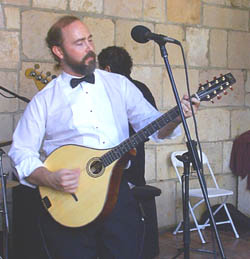Eric here.
I'm not even going to try and explain why this blog has been silent for so long. Maybe I should simply have retired it when the going got tough--it seems that blogs have a life-cycle, although writing that phrase instantly brings to mind the idea of blog life-cycle events (brit milah, Bar Mitzvah, etc.), and I really don't want to go there.
Anyway, now that fall quarter is more or less done, I might as well give this another go, and it just so happens that I have some material to post. Last weekend, you see, I was off at the Jewish Reconstructionist Federation's biannual convention in Boston, on a panel called "Why Do We Pray? Continuing the Conversation about Reconstructionist Liturgy." My colleagues on the panel were Rabbi Eric Caplan (author of
From Ideology to Liturgy: Reconstructionist Worship and American Liberal Judaism) and Catherine Madsen, whose book
The Bones Reassemble: Reconstituting Liturgical Speech you need to know if you have any interest in liturgy as a language-art. (She also writes the best parodies of progressive liturgy I've ever seen, which is an art in its own right.) Dan Cedarbaum, past president of the JRF, was the convener and chair.
My contribution? A sheaf of poems, by Jews and others, that struck me as useful in thinking about what prayer is and what poetry can teach us about it. I read a few out loud and talked about them, and I figure I can post those up here, a little at a time, to get myself back in the habit of blogging again.
The first ones I spoke about come from the Amichai sequence "Gods Come and Go, Prayers Remain Forever," in
Karen Alkalay-Gut's translation, which I found on line in
The Drunken Boat. I used numbers 1, 3, and 9, but really only talked about 3, and the core insight (Amichai's and others') that prayer
precedes theology, and that poems about prayer remind us of the
need--at once vulnerability and desire--that lies behind, or comes before, the rituals and creeds and other products of the God-making imagination.
("Out of deep need," as Zukofsky says somewhere. Yes?)
Anyway, here are the Amichai poems that were in that little handout. The rest you can now click over to, and if you have any thoughts (about these or about the Hebrew originals, what's lost in translation, whatever), let me know!
1.
On the street, one summer evening,
I saw a woman writing words
on paper unfolded on a locked wooden door.
And she folded it and put it between the door and the mezuzah and went away.
And I didn't see her face nor the face of the person
who would read the note,
and I didn't see the words.
A stone rests on my desk with the word "Amen" written on it.
It is a piece of a tomb, a vestige from a Jewish cemetery
destroyed a thousand years ago, in the city where I was born.
One word, "Amen," is cut deep into the stone—
A hard and final Amen for all that is past and will not return,
a soft and melodious amen like a prayer.
Amen and amen, and may it be His will.
Tombstones break, words pass, words are forgotten,
lips that uttered them turn to dust,
languages die like people,
and other languages are resurrected,
gods in the heavens change, gods come and go.
Prayers remain forever.
3.
I say with perfect faith
that prayers precede God.
Prayers created God.
God created man,
And man creates prayers
that create God who creates man.
9.
The Jewish people read the Torah to God
all year long, a chapter a week,
like Sheherezade who told stories to save her life,
and by the time the Celebration of the Torah comes around,
He forgets and we may begin again.
Translated by
Karen Alkalay-Gut
